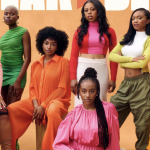Thousands of HIV/AIDS advocates met up in Washington, DC, for this year’s United States Conference on AIDS (USCA), which took place September 10 to 13. In a series of lectures, workshops and other events, USCA helped build community and highlight the biggest issues facing activists, educators, care providers and people living with HIV today.
As a wrap-up, POZ compiled some social media highlights from USCA that drill down into the top 10 issues we noticed permeating the conference.
1) #BlackLivesMatter
“The opposite of poverty is not wealth, the opposite of poverty is justice.” #2015USCA
— Ulysses III (UB) (@UlyssesBurley) September 11, 2015
Powerful #2015USCA #BlackLivesMatter Opening Plenary. #TogetherTakeover #StopHIVTogether -FR
Sep 10, 2015 at 7:20am PDT
USCA 2015’s opening plenary set the stage for four days of intense discussions about race and HIV/AIDS, which tied into this year’s conference theme, “The numbers don’t lie: It’s time to end disparities!”
2) #TransLivesMatter
When #trans people are under attack, what do we do? Stand up, fight back! @translatinbamby took over #2015USCA pic.twitter.com/t7BeBCaIRe
— 鍾紹琪 (Cecilia Chung) (@cecilia_c_chung) September 11, 2015
Trans activists seize the stage at #2015USCA yelling ACT UP Fight Back! pic.twitter.com/3O3b2qT9UF
— Peter Staley (@peterstaley) September 11, 2015 On Friday, September 11, transgender activists took the stage at USCA 2015 to make sure their voices were heard in the larger HIV/AIDS community.
3) HIV Criminalization
#2015USCA #TurnItUp is here! Get one at the @pozmagazine booth #101 @TheSeroProject @HIVIsNotACrime pic.twitter.com/QutUWXUj4i
— Ken Pinkela (@kenpinkela) September 10, 2015
“if we want people to disclose, then we have to make it legally safe to disclose” #HIV #criminalization #2015USCA
— Latinos in DeepSouth (@LatinoDeepSouth) September 12, 2015
Several sessions and activists at USCA 2015 focused in on the Sero Project’s motto: “HIV Is Not a Crime.”
4) Sex Workers’ Rights
“The government is giving you money to distribute condoms, then arresting the people you are giving condoms to.” #2015USCA #sexworkers
— Brenden Shucart (@Brenshu) September 13, 2015
“All of the money is going to ’save’ me, where is the money to empower me?” #2015USCA #sexworkers https://t.co/wgPVPotK4C
— Brenden Shucart (@Brenshu) September 13, 2015
Should sex work be decriminalized in the United States to help prevent new HIV/AIDS infections? Activists fiercely debated the topic throughout the conference.
5) HIV-Positive Women
Attendee on lack of HIV protection options for women: “I want as many options for my vagina as my hair.” #PrEP #2015USCA #BlackAIDS
— britni danielle (@BritniDWrites) September 11, 2015
Shame, anger, abuse, and reminders of betrayal drop women out of HIV care. #2015USCA pic.twitter.com/QmTVmgcgOI
— Impact Marketing (@ImpactMC1) September 11, 2015
Through teaching self-empowerment and pointing out huge gaps when it comes to women and HIV prevention, among other things, female activists had a lot to say about their place in the larger framework of the positive community.
6) HIV in the South
“Don’t take the fork off our table and expect us to eat with our hands.” #2015USCA Day 3 Lunch Plenary pic.twitter.com/OxWDOWoZlh
— Capacity for Health (@c4htips) September 12, 2015
The failure to expand Medicaid threatens the health and lives of people living with HIV in south. #2015USCA pic.twitter.com/MO7YjlEzc9
— AIDS United (@AIDS_United) September 12, 2015 The statistics are clear: The Deep South is the new epicenter of HIV/AIDS in the United States. Southern activists discussed some unique challenges facing them in their fight to end AIDS in their communities.
7) HIV, Latinos and Border Politics
#Mexico does provide free #HIV medical care to returning/deported Mexicans with HIV. #2015usca
— Jesus Chuche Chavez (@jchuchechavez) September 13, 2015
#immigrants have a fear of getting medical care because of the fear of #ICE and #deportation #HIV #2015usca
— Jesus Chuche Chavez (@jchuchechavez) September 13, 2015
#HIV #positive people in the #border are more common to miss treatment care visits, increasing their mortality rate #2015usca
— Jesus Chuche Chavez (@jchuchechavez) September 13, 2015
Latino activists made sure their voices were heard—especially those who spoke up for the rights of the undocumented, uninsured and uninformed about the few culturally relevant HIV/AIDS services in this country.
8) Reigniting Activism
The anger that drove us to action then is still tappable now. @peterstaley #2015USCA #hivactivism pic.twitter.com/stTn1zCMy4
— Impact Marketing (@ImpactMC1) September 12, 2015
The HIV/AIDS epidemic is far from over, and activists across the country came together to discuss strategies for how to keep the momentum going in the fight against the virus.
9) Social Media Strategies
This year was by far one of the social media-savviest gatherings to date. Activists connected online, had some fun at the USCA booths and learned new ways to digitally expand their audiences.
10) Youth Activism
Want to know where the future of the fight against HIV/AIDS is headed? USCA’s 2015 Youth Scholars were total all-stars at the conference when it came to keeping the discussions on the cutting edge of empowerment. (Read mini-bios on all the scholars here.)
For more information about what went down this year at USCA, which is organized by the National Minority AIDS Council, visit 2015usca.org and nmac.org, or check out the hashtag #2015USCA on social media.
And don’t miss our related POZ newsfeed item, “10 Tweets From #2015USCA to Empower Your Activism”.







Comments
Comments